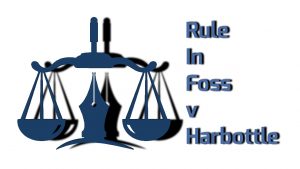Exceptions to Foss v Harbottle: “The majority have their way but the minority have their say” is a popular statement that accords with democratic principles. The statement is to the effect that in an organization where democracy reigns, the views or decisions of the majority will hold sway, the views or dissent of the minority notwithstanding. It is usually used in corporate governance or in the administration of Trade Unions where decisions are expected to be taken by a collection of individuals and not just a sole individual. Therefore, for there to be proper and smooth running of the internal affairs of an organization or company, this democratic principle of majority rule is a desideratum.
It is in the light of this that the rule in Foss v Harbottle was developed to guide the internal administration of a corporate body or organization. The case is a locus classicus in English Company Law as it deals with corporate governance.

The Rule in Foss v Harbottle is synonymous to corporate sovereignty and majority rule in Company Law. The rule as espoused in the case is to the effect that where a company suffers losses due to the negligent or fraudulent act of some of its directors or members, only the company can bring an action with respect to such acts. Thus, where the company refuses to institute an action, or the majority of the members of the company have resolved not to institute proceedings, an individual or a minority can not bring an action claiming losses for that suffered by the company.
Recommended: Exceptions to the rule in Rylands v Fletcher
Facts of Foss v Harbottle (Summary)
The brief fact of the case is that a company, the Victoria Park Company, was set up to buy certain parcels of land and transform the land into a Park in Manchester. The company was later incorporated by an Act of Parliament in which the company was to lay out and maintain ornamental Parks in Lancaster. It was alleged by two minority shareholders (the plaintiffs) of the company that the company’s assets had been misapplied and its property improperly mortgaged. Hence the two shareholders brought an action against the five directors of the company (defendants) to make good the company’s losses.

Also see: Exceptions to the rule in Pinnel’s case
Issue determined
The issue for determination in the case was whether the two minority shareholders of the company had the locus standi (capacity) to sue on behalf of the company, compelling the majority to make good the losses of the company.
Judgment of the court in Foss and Harbottle
The Court of Chancery, per Wigram VC, in dismissing the suit by the minority shareholders held that the company was a separate legal entity from its shareholders and as such such, no individual shareholder can bring a suit against the company. The company, by virtue of the fact that it has a separate legal entity from its members is the only one that can sue where it has suffered losses or damage and not the individual. This is because it was the company that suffered the loss and not the individual.
The Court went further to hold that where a majority of the members of a company has ratified an act done by the company, the court will do no more in meddling into the internal affairs of the company as the company has the power to ratify such acts done through its members in General Meeting. Any act of interference into this power by the courts will mean that the company is bereft of such powers to ratify an act done by its directors.
Also see: Process of law making in Canada: See How laws are made
Rationale for the rule In Foss and Harbottle
The reason behind the rule in Foss v Harbottle is anchored majorly on four principles namely:
a. It acts to prevent multiplicity of suits over similar incidents arising from the same set of facts, as if every individual shareholder is allowed to sue over any perceived wrong done to the company, the company will be exposed to so many suits;
b. The members in a General Meeting have the powers to ratify the wrongful acts of the directors, thus, if an aggrieved individual can sue, then the power of the General Meeting to ratify acts done by the directors will be meaningless;
c. It logically accords with the doctrine of separate legal personality of the company as only the company can sue where it has suffered a loss. This is because it was the company that suffered the loss and not the individual member or shareholder; and
d. The rule preserves the majority rule principle.
In the case of Edwards v Harliwell, the Court in stating the reason for the rule held inter alia;
‘If a mere majority of members of a company or association is in favour of what has been done then cadit qua estio. No wrong had been done to the company or association and there is nothing in respect of which any one can sue. If on the other hand, a simple majority of members of the company or association is against what has been done, then there is no valid reason why the company should not sue’.
The above dicta of the court succinctly summarized the rationale behind the rule in Foss v Harbottle.
Also see: Differences between constitution and constitutionalism
Exceptions to the Rule In Foss v Harbottle
The strict application of the rule occasioned hardship on minority members of a company who had genuine grievances. The majority were at liberty to do whatever, how ever, and whenever they wished without regard to the overall interest of the company. To curb the excesses of the majority members, several rules were made as exceptions to the rule in Foss v Harbottle. These exceptions became known as minority protection in corporate governance.
The exceptions serve as a safeguard to the rights and interests of the minority members of the company and by extension, the company. The exceptions to the rule will be applied where certain things take are detrimental to the interest of the minority and the company are done. In this situation, the decision of the minority will override that of the majority. The various exceptions to the Rule will be discussed hereunder.

Must read: How to read and understand faster than before
1. Illegal and Ultra Vires Acts: Where the act complained of by the minority is illegal or done ultra vires the company, the company cannot ratify such transaction. That is, if the act complained of was not an action the company could perform by virtue of its Memorandum and Articles of Association, the company cannot ratify the act as it cannot do that which it had no power to do in the first place. Thus, in Smith v Croft where the act in question bordered on the giving of financial assistance to facilitate the acquisition of shares in the company, which was ultra vires the company and contrary to the provisions of the Company Act 1881, the Court held that a minority individual shareholder can maintain an action against the company as the company cannot ratify an illegal act.
2. Where irregularities are done in the performance of an act: If a company purports to do an act, though within its powers to do, in an irregular manner, a minority member can sue to compel the company to follow due process in the performance of that act. For example, where a company does an act by a simple resolution whereas a special resolution is required.
In Cotter v National Union of Seamen, the plaintiff had complained that a certain special general meeting was illegally convened and that the resolutions passed at that meeting be declared invalid. It was decided that where irregularities are committed in the convening and conduct of a meeting at which the resolutions complained of where passed, the matters could be regularized by the passing of fresh and effective resolutions. Thus a minority can sue to compel the company or organization to follow due process in the conduct of its affairs.
Recommended: Top 10 Law Firms in the World 2021
3. Where the act complained of Constitutes a fraud on the minority and it also infringes on the individual members’ personal rights: If the action constitutes a fraud against the minority and those who are to remedy the fraud are the ones in control of the company and they are likely not to sue; or they are the alleged doers of the act, and will not allow an action to be brought in the name of the company, the minority can sue to enforce such rights in their own names.
Again, if the act complained of infringes on the personal rights of the individual, he can sue to enforce such rights.
4. Where the directors are likely to derive benefits or actually benefitted from their own negligence or breach of duty: If the directors of a company negligently do an act or are in breach in the performance of their duties, and they are likely to benefit from such negligence or breach of duty, the minority can bring an action to stop them from deriving any such benefits. Thus, they will be barred from benefitting from their own wrongdoing.
The Rule in Foss v Harbottle combines the doctrine of separate legal personality, statutory contract, internal management principles and the principle of majority rule into the procedural rule of locus standi. The rule stands not to interfere with the internal workings of an organization. However, the strict application of the rule caused hardship on minority rights, hence the various exceptions developed to mitigate the hardship imposed by the strict application of the rule.

Edeh Samuel Chukwuemeka, ACMC, is a lawyer and a certified mediator/conciliator in Nigeria. He is also a developer with knowledge in various programming languages. Samuel is determined to leverage his skills in technology, SEO, and legal practice to revolutionize the legal profession worldwide by creating web and mobile applications that simplify legal research. Sam is also passionate about educating and providing valuable information to people.
Thanks Samuel. This was helpful. Very easy to comprehend